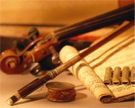Vocals of Verdi, violin of Vivaldi
 ESSENTIAL VERDI: 40 of Verdi`s masterpieces; variety of singers, conductors, orchestras. Decca 467 128; 2 CDs; ADD, DDD.
ESSENTIAL VERDI: 40 of Verdi`s masterpieces; variety of singers, conductors, orchestras. Decca 467 128; 2 CDs; ADD, DDD. I do not like smorgasbords. The reason is this: I seem not to be able to constrain myself from selecting at least a little of everything. But as it turns out, my idea of "a little" inevitably becomes rather generous portions of each item offered.
First thing I know, my taste buds are pleading for some sense of control on my part, and my stomach is threatening open revolt.
Now that`s for food. For music, it`s a different story entirely.
Bring on the variety, and lot`s of it. Therefore, I`m the kind of listener who is in hog heaven with recordings such as those being considered here.
First of all, we`re listening to opera. That in itself is heavenly. Next, we`re listening to Verdi. Which reminds me of a television commercial you might have heard in which a national bakery says of its products:
"Nobody doesn`t like Sara Lee."
Same with opera:
"Nobody doesn`t like Verdi."
This two-CD album includes 38 selections from Verdi`s operas and two from his requiem. Total playing time, eight seconds less than 1:57.
The singers: A wide swath of who`s who (and in some cases who was who), in the opera world: Among others, Placido Domingo, Luciano Pavarotti, Jose Carreras (known the world over as The Three Tenors), Dame Joan Sutherland, Carlo Bergonzi, Leontyne Price, Carlo Bergonzi, Jussi Bjorling, Margaret Price, Angela Gheroghiu, Rene Fleming, Kiri Te Kanawa, Montserrat Caballe, Katia Ricciarelli.
The conductors: Among others, Richard Bonynge, Sir Georg Solti, Valery Gergiev, John Pritchard, Nello Santi, Colin Davis, Bernard Haitink, Herbert von Karajan, Riccardo Chailly, Giuseppe Sinopoli.
The orchestras: Among others, London Symphony Orchestra, Chicago Symphony Orchestra, Kirov Orchestra of the Maninsky Theater St. Petersburg, Orchestra of the Royal Opera House Covent Garden, Orchestra del Teatro del` Opera di Roma, Vienna Philharmonic, Paris Conservatoire Orchestra, National Philharmonic Orchestra, Orchestra Sinfonica di Milano Giuseppe Verdi, Orchestra del Teatro alla Scala di Milano.
And this is my review: After listing these singers, conductors and orchestras, what more would there be to say?
The sound? You`re right. I should have mentioned the sound. These recordings were made in the `60s, `70s, `80s and `90s. That means they were recorded when these singers were at the peak of there vocal abilities. The sound is very good throughout. The quality of the artistry is probably unmatchable today. I simply cannot imagine anybody who loves opera, and especially anybody who favors Verdi, not wanting to have this collection in her or his library.
So step up to this musical smorgasbord and stuff yourselves.
VIVALDI: Concertos Op. 8, No. 1-4 - The Four Seasons. Kyung Wha Chung, violin; St. Luke`s Chamber Ensemble. EMI Classics 57015.
We may sometimes forget that Vivaldi`s work "The Four Seasons" is a collection of four violin concertos, meant to be played one after another, each representing one of the seasons of the year.
It`s even easier to forget that the works were written to a series of four sonnets; again, each sonnet meant to be representative of one of the four seasons. Sometimes this isn`t even known to listeners who hold this music in great esteem.
"The Four Seasons," then, constitute a prime example of program music. In considering the music and the sonnets together, one would have a difficult time finding a more perfect example of onomatopoeia.
The complete work of which which "The Four Seasons" is a part is titled Il cimento dell`armonia e dell`Inventione (The Contest Between Harmony and Invention) and consists of two book of six concertos each. The work was published in 1711 as Vivaldi`s Opus 8. The Four Seasons, La Primavera (Spring), Estate (Summer), Autunno (Autumn) and L`inverno (Winter) are placed as Nos. 1-4 in Book II. As for the sonnets, the poet is not known with any exactitude, although there have been claims that the poet was Vivaldi himself.
So much has been written about Vivaldi`s work, particularly his violin concertos. Some writers have called them, in effect, show-off pieces, works to prove just how fast a violinist could play. But this mainly was in earlier times. Today he`s box office. And its hard to believe that until the beginning of the 20th century there were far more of his concertos that had not been published than had been published. In all, he wrote more than 400 concertos. Only a part of his compositional genius. He also wrote some 46 known operas and claimed to have written more than twice that number.
And with all this, the bright, shinning star of his work remains "The Four Seasons."
A check of Schwann`s catalog of recordings OPUS lists so many recordings of the work that I fear I would not have time to count all of them before my next column is due.
So, why another recording? This is my answer: I don`t know. And I don`t care why. Kyung What Chung is a brilliant violinist who plays these lovely concertos to near perfection. She has as co-artists the members of St. Luke`s Chamber Ensemble, some 16 string players and continuo from the famed Orchestra of St. Luke`s in New York. Together they turn out an exemplary account of this treasured series of violin concertos by Vivaldi.
(c) Copley News Service
advertisement

Related Articles
Author: King Durkee
Archives
Nathan Milstein first among equals
Musical mastery is in the details
Half century of classics sprout from modest seed
Hundred years warble: sounds of a century
A Vivaldi album for all seasons
Westminster lives on
15-work collection a tribute to compassion
Remastered recordings music to the ears
Grand band music
The elusive quality of superstars
Vault yields some forgotten gems
Remembering Rampal
Argerich is always awesome
Mahler - words and music
Liszt`s music at its best
More Articles






